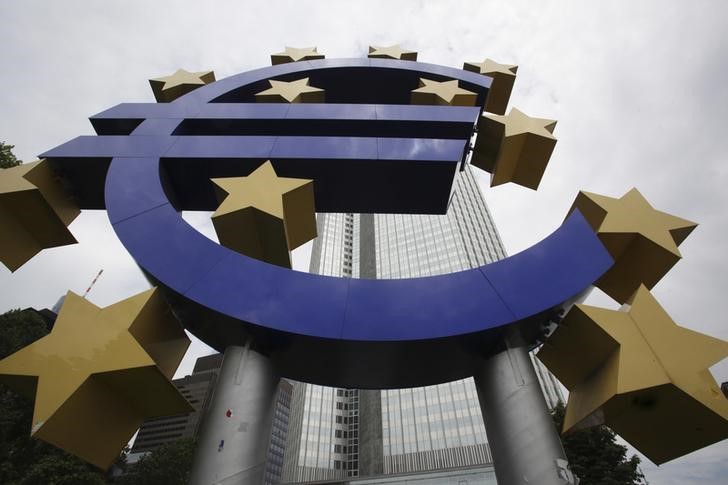By Sumanta Dey
(Reuters) - The euro zone economy looks set for a prolonged period of modest growth and low inflation, according to a Reuters poll, with expectations from the start of the year that growth was about to accelerate having all but evaporated.
A sharp fall in global oil prices last year raised hopes of a boost to consumer spending which, coupled with the European Central Bank's stimulus programme and a weaker currency, would accelerate the growth momentum seen in the first quarter.
However, almost half a year into the ECB's 60 billion euro a month bond buying scheme and with oil prices not far off January's low levels, predictions for growth, inflation, factory output and unemployment are yet to change meaningfully.
The poll of almost 70 economists, taken in the past week, showed gross domestic product growth would languish between 0.3 and 0.5 percent each quarter from now until end-2016 in the euro zone and its largest economies - Germany, France and Italy.
That is consistent with annual growth rates of 1.4 percent in 2015 and 1.7 percent next year for the euro zone and slightly higher at 1.8 percent and 1.9 percent respectively for Germany.
The outlook is even weaker for France and Italy, the latter of which peeped out of recession at the start of the year to report tentative growth for the first time in three years.
"The euro area economy is still on track for a modest recovery in 2015," wrote Philippe Gudin, head of European economics research at Barclays (LONDON:BARC) in a note.
"However, business confidence has been levelling off since the beginning of the year and we do not expect growth to accelerate further over the next two years, while inflation, although having bottomed, will rebound only gradually and is unlikely to approach the ECB's 2 percent target anytime soon."
The U.S. economy, by contrast, is expected to expand 2.3 percent this year and 2.8 percent next, cementing predictions the Federal Reserve will soon raise interest rates in the world's largest economy, most likely in September. [ECILT/US]
At a time when emerging economies in Asia and Latin America are rapidly cooling, that leaves much of the responsibility for driving global growth to the United States. [ECILT/WRAP]
In the short-term at least, prospects for the euro zone economy look slightly better with a deal now struck between Greece and its international creditors, led by Germany.
Greek Prime Minister Alexis Tsipras on Thursday managed to stem a rebellion in his own party and pass through parliament a second package of reforms necessary to begin talks on a third bailout programme worth 86 billion euros.
The seemingly never-ending Greek debt crisis has largely dominated financial markets over recent months and threatened to break the monetary union.
But when asked to rate how concerned they were that the wrangling over Greece had dulled the positive euro zone growth momentum, a majority of economists said they were 'not concerned'.
Still, over three months after the same set of economists said they thought the euro zone economy was turning a corner, there is no significant uptick in predictions, not even for inflation which bounced back above the zero line recently.
Inflation in the euro zone is expected to rise 0.4 percent this quarter and 0.8 percent next. While it is expected to accelerate further next year, the median consensus is for inflation to average just 1.5 percent even in 2017.
And in an indication of how weak expectations really are, none in the sample of over 50 economists had an inflation forecast of 2 percent - the target ceiling for the ECB - anywhere in the poll horizon.
That could hinder ECB President Mario Draghi's plans to shutter its sovereign bond-buying programme by September 2016, especially with low oil prices, rising credit growth and a weak euro failing to generate meaningful consumer demand or new jobs.
The euro zone unemployment rate is seen averaging over 10 percent through 2017, more than double U.S. and British levels.

The disappointing performance of core euro zone economies will probably be tempered by better activity in Spain, Portugal and Ireland where economists have mostly upgraded growth predictions for this year and next.
(Polling by Krishna Eluri and Sarbani Haldar in Bengaluru; Additional reporting by Isla Binnie in Milan; Editing by Ross Finley and Toby Chopra)